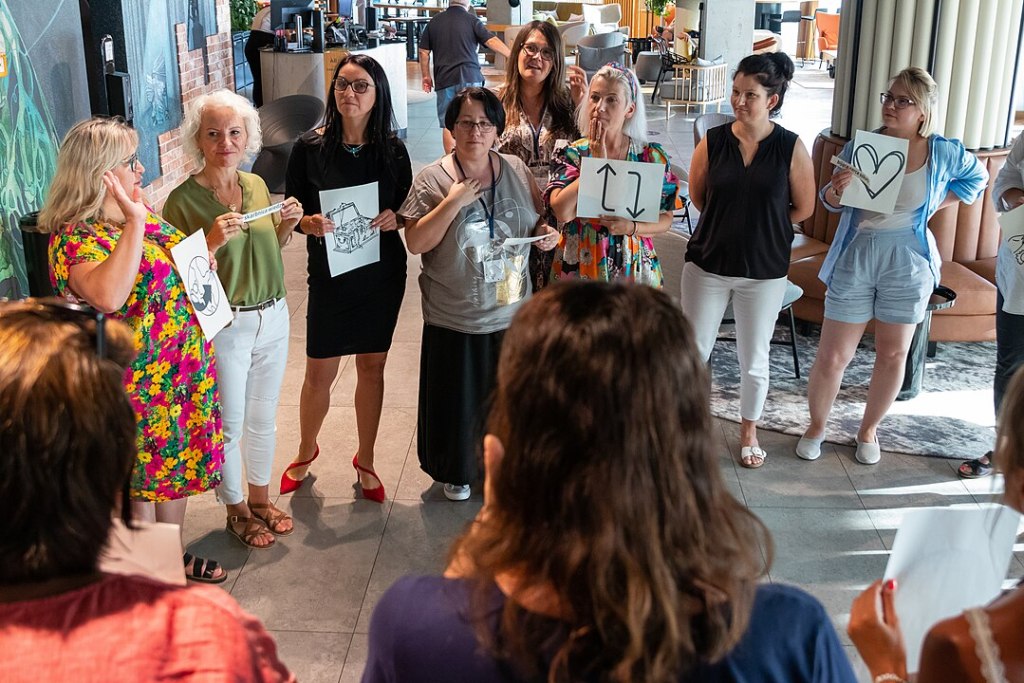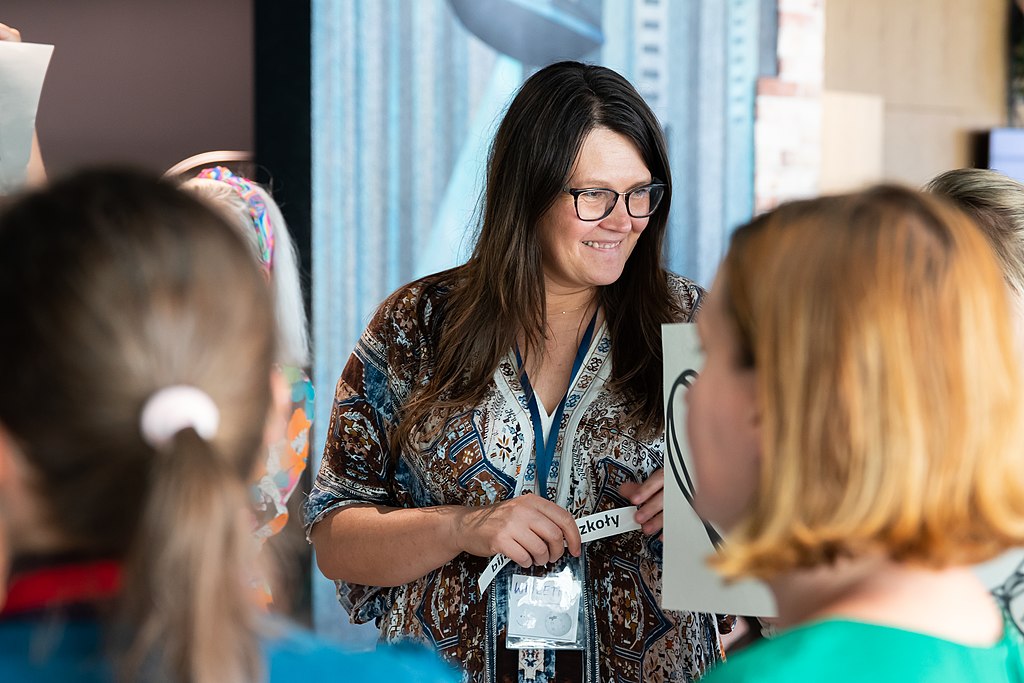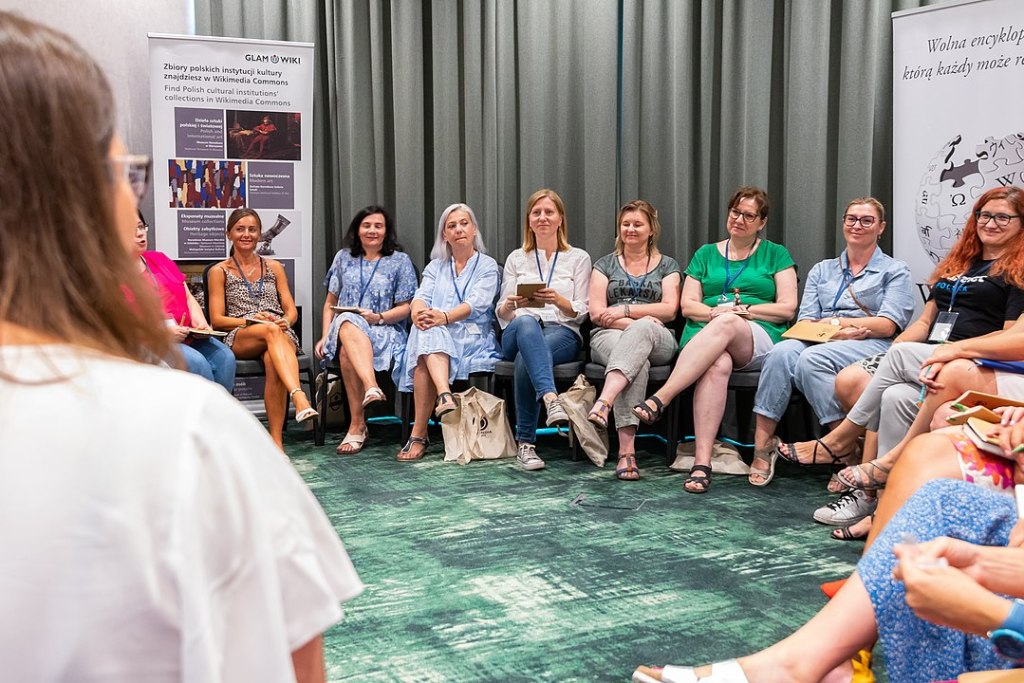
Wikiteka is one of the flagship projects of Wikimedia Polska (WMPL). Wioletta Matusiak, Open Education and Development Manager at WMPL, talks about its genesis and outcomes.
What is Wikiteka?
Wikiteka is an annual, nationwide program for developing the leadership competences of school librarians. The project is based on open educational resources (Wikipedia and sister projects) and technology. The project shapes the skills of being a leader by strengthening their role and encouraging them to act.
Origin of the project: where did the idea for Wikiteka come from?
During the pandemic it turned out that schools that had a digital change leader were successful. The research showed that the leaders in Polish schools were largely librarians (including Polish and English teachers). At the same time, school libraries were not properly recognized and researched. Librarians are natural allies of Wikimedians as people who understand the importance of sources, footnotes, etc.
We started our project by examining the needs of librarians and school libraries. In May 2022 we asked how they perceived their workplace, what they identified as the key challenges for the future, and how existing projects could be strengthened? Based on these answers we proposed activities tailored specifically to the needs of this group. The school library is a space at school that is free from limitations: in the library we do not evaluate, we work beyond the 45-minute lesson, in differentiated groups, we often work on projects, independently deciding on the effects of our work. Hence we believe that cooperating with school librarains is crucial – Wikimedia need new people, there is a shortage of novices. Also: we need to teach people to talk about Wikipedia differently, change the narrative – show that it is cool, it is worth writing and taking photos.
What are the greatest benefits for Wikiteka project participants?
The concept of competence development includes three components. This is knowledge – in our case knowledge about Wikipedia and its sister projects, knowledge about open educational resources, copyrights including CC licenses; these are skills – the ability to use modern educational methods (e.g. design thinking approach or working with students using the project method) in the work of the school library – the ability to use technology; and attitudes – shaping a leadership attitude – we encourage course participants to look at their working methods and dare to change, to initiate cooperation with organizations, to leave school to show students the possibilities of developing passions and interests outside school, to sensitize young people to social problems. Participation in Wikiteka shapes the attitude of an innovator and openness in participants, broadens educational horizons, and opens new fields and perspectives for educational activities in the library.
What are the benefits for WMPL and for the Polish community in general?
We are visible in primary and secondary schools, and the knowledge about Wikipedia and its sister projects is disseminated. The false stereotype about Wikipedia as a commercial information portal or a panorama of companies or a place where everyone expresses their opinions is not perpetuated. The Wikimedia community is invited to act as experts at conferences and training. It is also an opportunity to engage in other Wiki activities and share knowledge in various communities. We open ourselves to new environments, mainly women – thereby increasing diversity in the Polish community. In addition, we change the awareness of teachers who sometimes forbid the use of Wikipedia. Thanks to our project, teachers become ambassadors of Wikimedia – they spread this awareness to students. This is building capital for the future. School often lacks reflection on what Wikipedia is and how it works – we create conditions for this reflection.
How’s the second edition of Wikiteka different from the first?
In the first edition the training was focused on learning innovative educational methods such as Design Thinking, the project method, how to make Genius, how to make a video. We focused on various methods of working with young people. Wikipedia was in the online course which is one of the components of the program. In the second edition we decided to change the location of knowledge about Wikipedia. We introduced Wikipedia during an intensive live training where we invited Wikipedians, experts and trainers. And we did it because we saw that knowledge provided in an online course does not generate as much engagement as knowledge provided live. This is a friendlier way to provide information about the wiki world and an easier way to overcome the entry barrier.
What are the plans for future editions?
Currently we see that we need ready-made materials to work in these librarians’ environments. They are supposed to have knowledge about Wikipedia and sister projects and be able to talk about it, but they need to be prepared with materials that they can use. Some of the things we’re planning to introduce are:
– Escape room
– Five lessons in the Kolba series with videos and worksheets
– Presentation available for download
Projects about Wikipedia will certainly be implemented – tailored to the needs of given environments. Sample projects are:
– Walk with mindfulness
– Photo project about your own neighborhood added to Wikimedia Commons

What is most important about this project for you?
This project is consistent with the idea of openness. It gives you the opportunity to tailor your activities to suit yourself and the needs of your environment. The most important thing for me in this project is the opportunity to work openly with other people, develop them and create open educational resources. I have a unique opportunity to show that Wikipedia is an educational tool that equalizes educational opportunities. It shows values in the commercial world.
What was suprising about Wikiteka?
For me, the biggest surprise is that the project does not end. The participants of the first edition still cooperate with each other, develop and still want to work with us, want to be part of the community.
Jola Drzewakowska (Communication & PR Manager, WMPL) in her own words about Wikiteka:
For me the biggest surprise in contact with the Wikiteka community was the incredible openness to learning and the desire to improve one’s competences and skills. An additional value from my perspective is that participants have created a support network in which they motivate each other to take action and provide each other with honest feedback. Therefore, we are dealing with an open and active community whose participants are recognizable in their regions and at the same time are ambassadors of Wikimedia values. Wikiteka is also important because it noticed and appreciated the library environment as important in digital development, innovation and modern pedagogical approach. Libraries as organizations are important for Wikimedia also due to the source of entries in Wikipedia and 1Lib1Ref campaigns.


Can you help us translate this article?
In order for this article to reach as many people as possible we would like your help. Can you translate this article to get the message out?
Start translation